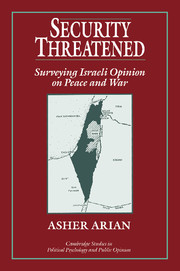6 - A People Apart
Published online by Cambridge University Press: 06 July 2010
Summary
AT RISK
The onus of Israel's security position was obvious. The country faced the seemingly undying enmity of most of its neighbors, prepared for and fought war after war, devoted a very large part of its population and financial resources to the imperatives of security (Brecher 1972; Horowitz 1982; Peri 1983). Geography and demography produced a very difficult security posture. The perception of threat was very real.
The reality of the Israeli situation – and certainly its rhetoric – was of a nation threatened. The clear feeling of basic mistrust regarding the international environment is a basic feature of the foreign and security policy of Israel. There is a fundamental belief that in the final analysis the world will do nothing to protect Jews, as individuals, as a collectivity, as a state. This is why the Holocaust was possible and why, if it depended on the world at large, the Holocaust could happen again. The fact that 82 percent of the 1986 sample expressed the opinion that a Holocaust is again unlikely seemed to be related to their faith in the Israel Defense Forces and not to their belief that the Gentiles had changed.
Early political leaders set the tone. While making enormous achievements in social and economic spheres in prestate Palestine, the Zionist leadership appeared stuck on the observation that the major actors in the international arena seemed to react to the Jews in a manner similar to what Jews had experienced elsewhere and before.
- Type
- Chapter
- Information
- Security ThreatenedSurveying Israeli Opinion on Peace and War, pp. 161 - 186Publisher: Cambridge University PressPrint publication year: 1995
- 1
- Cited by



